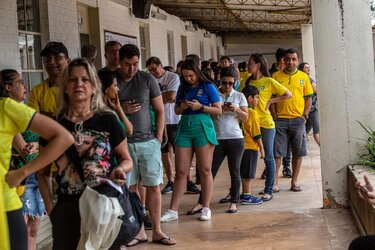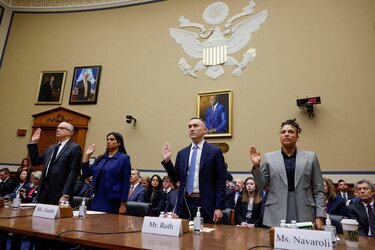Fact Checkers Take Stock of Their Efforts: ‘It’s Not Getting Better’
The New York Times (archive.ph)
By Tiffany Hsu and Stuart A. Thompson
2023-09-29 18:23:26GMT

“It’s not getting better,” said Tai Nalon, a journalist who runs the Brazilian fact-checking company Aos Fatos, of efforts to combat falsehoods.Credit...Dado Galdieri for The New York Times
After President Biden won the election nearly three years ago, three of every 10 Americans believed the false narrative that his victory resulted from fraud, a poll found. In the years since, fact checkers have debunked the claim in lengthy articles, corrections posted on viral content, videos and chat rooms.
This summer, they received a verdict on their efforts in an updated poll from Monmouth University: Very little has changed. Three of every 10 Americans still believed the false narrative.
With a wave of elections expected next year in dozens of countries, the global fact-checking community is taking stock of its efforts over a few intense years — and many don’t love what they see.
The number of fact-checking operations at news organizations and elsewhere has stagnated, and perhaps even fallen, after a booming expansion in response to a rise in unsubstantiated claims about elections and the pandemic. The social networking companies that once trumpeted efforts to combat misinformation are showing signs of waning interest. And those who write about falsehoods around the world are facing worsening harassment and personal threats.
“It’s not getting better,” said Tai Nalon, a journalist who runs Aos Fatos, a Brazilian fact-checking and disinformation-tracking company.
Elections are scheduled next year in more than 5,500 municipalities across Brazil, which a few dozen Aos Fatos fact checkers will monitor. The idea exhausts Ms. Nalon, who has spent recent years navigating a disinformation-peddling president, bizarre theories about the pandemic, and an increasingly polluted online ecosystem rife with harassment, distrust and legal threats.

Voters in Brasília in October. Elections are scheduled next year in more than 5,500 municipalities across Brazil, which a few dozen Aos Fatos fact checkers will monitor.Credit...Dado Galdieri for The New York Times
Ms. Nalon’s organization, one of the leading operations of its kind in Brazil, started in 2015 as attention to the fight against false and misleading content online surged. It was part of a fact-checking industry that bloomed around the world. At the end of last year, there were 424 fact-checking websites, up from just 11 in 2008, according to an annual census by the Duke University Reporters’ Lab.
The organizations used an arsenal of old and new tools: fact checks, pre-bunks that tried to inform viewers against misinformation before they encountered it, context labels, accuracy flags, warning screens, content removal policies, media literacy trainings and more. Facebook, which is owned by Meta, helped spur some of the growth in 2016 when it started working with and paying fact-checking operations. Online platforms, like TikTok, eventually followed suit.
Yet the momentum seems to be idling. This year, only 417 sites are active. The addition of new sites has slowed for several years, with just 20 last year compared with 83 in 2019. Sites such as the Baloney Meter in Canada and Fakt Ist Fakt in Austria have gone quiet in recent years.
“The leveling-off represents something of a maturing of the field,” said Angie Drobnic Holan, the director of the International Fact-Checking Network, which the nonprofit Poynter Institute started in 2015 to support fact checkers worldwide.
The work continues to draw interest from new parts of the world, and some think tanks and good-government groups have begun offering their own fact-checking services, experts said. Harassment and government repression, however, remain major deterrents. Political polarization has turned fact-checking and other misinformation defenses into a target among right-wing influencers, who claim that debunkers are biased against them.
Yasmin Green, chief executive of Jigsaw, a group within Google that studies threats like disinformation and extremism, recalled one study in which a participant scrolled past a fact check shared by a journalist from CNN and dismissed it out of hand. “Well, who fact-checks the fact checkers?” the user asked.
“We’re in this highly distrustful environment where you’re evaluating just on the basis of the speaker and distrusting people who you decided their judgment is not trustworthy,” Ms. Green said.

“We’re in this highly distrustful environment where you’re evaluating just on the basis of the speaker,” said Yasmin Green of Jigsaw, a group within Google that studies disinformation.Credit...Rengim Mutevellioglu for The Washington Post, via Getty Images
Intervening against misinformation has a broadly positive effect, according to researchers. Experiments conducted in 2020 concluded that fact checks in many parts of the world reduced false beliefs for at least two weeks. A team at Stanford determined that education about misinformation after the 2016 election had probably contributed to fewer Americans visiting websites in 2020 that were not credible.
Success, however, is inconsistent and contingent on many variables: the viewer’s location, age, political leaning and level of digital engagement, and whether a fact check is written or illustrated, succinct or explanatory. Many efforts never reach crucial demographics, while others are ignored or resisted.
After falsehoods swarmed Facebook during the pandemic, the platform instituted policies against Covid-19 misinformation. Some researchers, however, questioned the effectiveness of the efforts in a study published this month in the journal Science Advances. They determined that while the amount of anti-vaccine content had declined, engagement with the remaining anti-vaccine content had not.
“In other words, users engaged just as much with anti-vaccine content as they would have if content had not been deleted,” said David Broniatowski, a professor at George Washington University and an author of the paper.
The remaining anti-vaccine content was more likely to be misleading, researchers found, and users linked to less trustworthy sources than they did before Facebook put its policies in place.
“Our integrity efforts continue to lead the industry, and we are laser-focused on tackling industrywide challenges,” Corey Chambliss, a spokesman for Meta, said in an emailed statement. “Any suggestion to the contrary is false.”
In the first six months of this year, more than 40 million Facebook posts received a fact-check label, according to a report that the company submitted to the European Commission.
Social platforms where false narratives and conspiracy theories still spread widely have scaled back anti-disinformation resources over the past year. Researchers found that fact-checking organizations and similar outlets grew gradually more dependent on social media companies for a financial lifeline; misinformation watchers now worry that increasingly budget-conscious tech companies will start reducing their philanthropy spending.
Such a move could “really turn the screws on fact checkers,” said Yoel Roth, the former head of trust and safety at Twitter, which is now known as X.

Yoel Roth, former head of trust and safety at Twitter, said that if tech companies cut back on their philanthropy spending it could “really turn the screws on fact checkers.”Credit...Evelyn Hockstein/Reuters
If Meta ever cuts the budget for its third-party fact-checking program, it could “decimate an entire industry” of fact checkers that depend on its financial support, said Mr. Roth, now a visiting scholar at the University of Pennsylvania. (Meta said its commitment to the program had not changed.)
X has undergone some of the most significant changes of any platform. Its billionaire owner of less than a year, Elon Musk, embraced an experiment that relied on its own unpaid users rather than paid fact checkers and safety teams. The expanded fact-checking program — Community Notes — allows anyone to write corrections on posts. Users can deem a note “helpful” so it becomes visible to everyone; some notes have appeared alongside content from Mr. Musk and President Biden and even a viral post about a groundhog falsely accused of stealing vegetables.
X did not respond to a request for comment. Tech watchdogs fretted this week about the quality of content on X after The Information reported that the platform was cutting half the team dedicated to managing disinformation about election integrity; the company had said less than a month earlier that it planned to expand the team.
Crowdsourced fact-checking has shown mixed results in research, said Valerie Wirtschafter, a fellow at the Brookings Institution. An article she co-wrote in The Journal of Online Trust and Safety found that the presence of a Community Note did not keep posts from spreading widely. Users who created misleading posts saw no change in the engagement for subsequent posts, suggesting that they paid no penalty for sharing falsehoods.
Since most popular posts on X get a surge in attention within the first few hours, a Community Note added hours or days later would do little to reach people who had read the falsehoods, said Mr. Roth, who resigned from the company after Mr. Musk’s arrival last year.
“I’ve never found a way around having humans in the loop,” he said in an interview. “My belief, and everything I’ve seen, is that on its own, Community Notes is not a sufficient replacement.”
Defenders against false narratives and conspiracy theories are also struggling with another complication: artificial intelligence.
The technology’s reality-warping abilities, which still manage to stump many of the tools designed to identify their use, are already keeping fact checkers busy. Last week, TikTok said it would test an “A.I.-generated” label, automatically appending it to content detected as having been edited or created with the technology.
Tests are also being run using A.I. to quickly parse the enormous volume of false information, identify frequent spreaders and respond to inaccuracies. The technology, however, has a shaky track record with truth. After the fact-checking organization PolitiFact tested ChatGPT on 40 claims that had already been meticulously researched by human fact checkers, the A.I. either made a mistake, refused to answer or arrived at a different conclusion from the fact checkers half of the time.
Between new technologies, fluctuating policies and stressed watchdogs, the online information ecosystem is in its messy adolescent years — “it’s gangly, and it’s got acne, and it’s moody,” said Claire Wardle, a co-director of the Information Futures Lab at Brown University.
She is hopeful, however, that society will learn to adapt and that most people will continue to value accuracy. Misinformation during the 2022 midterm elections was less toxic than feared, thanks partly to media literacy efforts and training that helped the authorities respond far more quickly and aggressively to rumors, she said.
“We tend to get obsessed with the very worst conspiracies — the people who got radicalized,” she said. “Actually, the majority of audiences are pretty good at figuring this all out.”
Tiffany Hsu reports on misinformation and disinformation and its origins, movement and consequences. She has been a journalist for more than two decades. More about Tiffany Hsu
Stuart A. Thompson writes about how false and misleading information spreads online and how it affects people around the world. He focuses on misinformation, disinformation and other misleading content. More about Stuart A. Thompson
The New York Times (archive.ph)
By Tiffany Hsu and Stuart A. Thompson
2023-09-29 18:23:26GMT

“It’s not getting better,” said Tai Nalon, a journalist who runs the Brazilian fact-checking company Aos Fatos, of efforts to combat falsehoods.Credit...Dado Galdieri for The New York Times
After President Biden won the election nearly three years ago, three of every 10 Americans believed the false narrative that his victory resulted from fraud, a poll found. In the years since, fact checkers have debunked the claim in lengthy articles, corrections posted on viral content, videos and chat rooms.
This summer, they received a verdict on their efforts in an updated poll from Monmouth University: Very little has changed. Three of every 10 Americans still believed the false narrative.
With a wave of elections expected next year in dozens of countries, the global fact-checking community is taking stock of its efforts over a few intense years — and many don’t love what they see.
The number of fact-checking operations at news organizations and elsewhere has stagnated, and perhaps even fallen, after a booming expansion in response to a rise in unsubstantiated claims about elections and the pandemic. The social networking companies that once trumpeted efforts to combat misinformation are showing signs of waning interest. And those who write about falsehoods around the world are facing worsening harassment and personal threats.
“It’s not getting better,” said Tai Nalon, a journalist who runs Aos Fatos, a Brazilian fact-checking and disinformation-tracking company.
Elections are scheduled next year in more than 5,500 municipalities across Brazil, which a few dozen Aos Fatos fact checkers will monitor. The idea exhausts Ms. Nalon, who has spent recent years navigating a disinformation-peddling president, bizarre theories about the pandemic, and an increasingly polluted online ecosystem rife with harassment, distrust and legal threats.

Voters in Brasília in October. Elections are scheduled next year in more than 5,500 municipalities across Brazil, which a few dozen Aos Fatos fact checkers will monitor.Credit...Dado Galdieri for The New York Times
Ms. Nalon’s organization, one of the leading operations of its kind in Brazil, started in 2015 as attention to the fight against false and misleading content online surged. It was part of a fact-checking industry that bloomed around the world. At the end of last year, there were 424 fact-checking websites, up from just 11 in 2008, according to an annual census by the Duke University Reporters’ Lab.
The organizations used an arsenal of old and new tools: fact checks, pre-bunks that tried to inform viewers against misinformation before they encountered it, context labels, accuracy flags, warning screens, content removal policies, media literacy trainings and more. Facebook, which is owned by Meta, helped spur some of the growth in 2016 when it started working with and paying fact-checking operations. Online platforms, like TikTok, eventually followed suit.
Yet the momentum seems to be idling. This year, only 417 sites are active. The addition of new sites has slowed for several years, with just 20 last year compared with 83 in 2019. Sites such as the Baloney Meter in Canada and Fakt Ist Fakt in Austria have gone quiet in recent years.
“The leveling-off represents something of a maturing of the field,” said Angie Drobnic Holan, the director of the International Fact-Checking Network, which the nonprofit Poynter Institute started in 2015 to support fact checkers worldwide.
The work continues to draw interest from new parts of the world, and some think tanks and good-government groups have begun offering their own fact-checking services, experts said. Harassment and government repression, however, remain major deterrents. Political polarization has turned fact-checking and other misinformation defenses into a target among right-wing influencers, who claim that debunkers are biased against them.
Yasmin Green, chief executive of Jigsaw, a group within Google that studies threats like disinformation and extremism, recalled one study in which a participant scrolled past a fact check shared by a journalist from CNN and dismissed it out of hand. “Well, who fact-checks the fact checkers?” the user asked.
“We’re in this highly distrustful environment where you’re evaluating just on the basis of the speaker and distrusting people who you decided their judgment is not trustworthy,” Ms. Green said.

“We’re in this highly distrustful environment where you’re evaluating just on the basis of the speaker,” said Yasmin Green of Jigsaw, a group within Google that studies disinformation.Credit...Rengim Mutevellioglu for The Washington Post, via Getty Images
Intervening against misinformation has a broadly positive effect, according to researchers. Experiments conducted in 2020 concluded that fact checks in many parts of the world reduced false beliefs for at least two weeks. A team at Stanford determined that education about misinformation after the 2016 election had probably contributed to fewer Americans visiting websites in 2020 that were not credible.
Success, however, is inconsistent and contingent on many variables: the viewer’s location, age, political leaning and level of digital engagement, and whether a fact check is written or illustrated, succinct or explanatory. Many efforts never reach crucial demographics, while others are ignored or resisted.
After falsehoods swarmed Facebook during the pandemic, the platform instituted policies against Covid-19 misinformation. Some researchers, however, questioned the effectiveness of the efforts in a study published this month in the journal Science Advances. They determined that while the amount of anti-vaccine content had declined, engagement with the remaining anti-vaccine content had not.
“In other words, users engaged just as much with anti-vaccine content as they would have if content had not been deleted,” said David Broniatowski, a professor at George Washington University and an author of the paper.
The remaining anti-vaccine content was more likely to be misleading, researchers found, and users linked to less trustworthy sources than they did before Facebook put its policies in place.
“Our integrity efforts continue to lead the industry, and we are laser-focused on tackling industrywide challenges,” Corey Chambliss, a spokesman for Meta, said in an emailed statement. “Any suggestion to the contrary is false.”
In the first six months of this year, more than 40 million Facebook posts received a fact-check label, according to a report that the company submitted to the European Commission.
Social platforms where false narratives and conspiracy theories still spread widely have scaled back anti-disinformation resources over the past year. Researchers found that fact-checking organizations and similar outlets grew gradually more dependent on social media companies for a financial lifeline; misinformation watchers now worry that increasingly budget-conscious tech companies will start reducing their philanthropy spending.
Such a move could “really turn the screws on fact checkers,” said Yoel Roth, the former head of trust and safety at Twitter, which is now known as X.

Yoel Roth, former head of trust and safety at Twitter, said that if tech companies cut back on their philanthropy spending it could “really turn the screws on fact checkers.”Credit...Evelyn Hockstein/Reuters
If Meta ever cuts the budget for its third-party fact-checking program, it could “decimate an entire industry” of fact checkers that depend on its financial support, said Mr. Roth, now a visiting scholar at the University of Pennsylvania. (Meta said its commitment to the program had not changed.)
X has undergone some of the most significant changes of any platform. Its billionaire owner of less than a year, Elon Musk, embraced an experiment that relied on its own unpaid users rather than paid fact checkers and safety teams. The expanded fact-checking program — Community Notes — allows anyone to write corrections on posts. Users can deem a note “helpful” so it becomes visible to everyone; some notes have appeared alongside content from Mr. Musk and President Biden and even a viral post about a groundhog falsely accused of stealing vegetables.
X did not respond to a request for comment. Tech watchdogs fretted this week about the quality of content on X after The Information reported that the platform was cutting half the team dedicated to managing disinformation about election integrity; the company had said less than a month earlier that it planned to expand the team.
Crowdsourced fact-checking has shown mixed results in research, said Valerie Wirtschafter, a fellow at the Brookings Institution. An article she co-wrote in The Journal of Online Trust and Safety found that the presence of a Community Note did not keep posts from spreading widely. Users who created misleading posts saw no change in the engagement for subsequent posts, suggesting that they paid no penalty for sharing falsehoods.
Since most popular posts on X get a surge in attention within the first few hours, a Community Note added hours or days later would do little to reach people who had read the falsehoods, said Mr. Roth, who resigned from the company after Mr. Musk’s arrival last year.
“I’ve never found a way around having humans in the loop,” he said in an interview. “My belief, and everything I’ve seen, is that on its own, Community Notes is not a sufficient replacement.”
Defenders against false narratives and conspiracy theories are also struggling with another complication: artificial intelligence.
The technology’s reality-warping abilities, which still manage to stump many of the tools designed to identify their use, are already keeping fact checkers busy. Last week, TikTok said it would test an “A.I.-generated” label, automatically appending it to content detected as having been edited or created with the technology.
Tests are also being run using A.I. to quickly parse the enormous volume of false information, identify frequent spreaders and respond to inaccuracies. The technology, however, has a shaky track record with truth. After the fact-checking organization PolitiFact tested ChatGPT on 40 claims that had already been meticulously researched by human fact checkers, the A.I. either made a mistake, refused to answer or arrived at a different conclusion from the fact checkers half of the time.
Between new technologies, fluctuating policies and stressed watchdogs, the online information ecosystem is in its messy adolescent years — “it’s gangly, and it’s got acne, and it’s moody,” said Claire Wardle, a co-director of the Information Futures Lab at Brown University.
She is hopeful, however, that society will learn to adapt and that most people will continue to value accuracy. Misinformation during the 2022 midterm elections was less toxic than feared, thanks partly to media literacy efforts and training that helped the authorities respond far more quickly and aggressively to rumors, she said.
“We tend to get obsessed with the very worst conspiracies — the people who got radicalized,” she said. “Actually, the majority of audiences are pretty good at figuring this all out.”
Tiffany Hsu reports on misinformation and disinformation and its origins, movement and consequences. She has been a journalist for more than two decades. More about Tiffany Hsu
Stuart A. Thompson writes about how false and misleading information spreads online and how it affects people around the world. He focuses on misinformation, disinformation and other misleading content. More about Stuart A. Thompson

